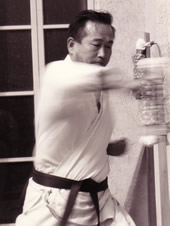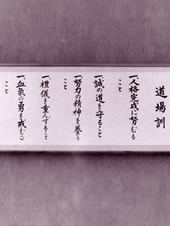Forging a Karate Mind

Karate is not a game of points, weight classes or showy demonstrations. It is a martial art and way of life that trains a practitioner to be peaceful; but if conflict is unavoidable, true karate dictates taking down an opponent with a single blow. Such an action requires strength, speed, focus, control. But these physical aspects are only part of the practice; they are just the vehicle, not the journey itself.True karate is based on Bushido. In true karate, the body, mind andspirit—the whole person—must be developed simultaneously. Through kihon, kumite and kata we learn to control our movements. But more im-portantly, we learn to give up con-trol too. We can perform the tech-niques without thinking about them, and remain focused without havingto concentrate on any one thing. In essence, the body remembers howto move and the mind remembershow to be still.This harmonious unity of mind and body is intensely powerful. Even the greatest physical strength and skill are no match for the power of wholeness.The result of true karate is natural, effortless action, and the confidence, humility, openness and peace only possible through perfect unity of mind and body. This is the core teaching of Zen, the basis of Bushido, and the of the JKA’s karate philosophy.
Bushido: The Way of the Samurai

Bushido has been the samurai code of conduct in Japan for centuries. Based firmly on the teachings of Zen, Bushido was intended to help the samurai master their nature and understand their minds and the uni-verse through direct experience—as well as through fostering strength, self-control and wisdom.Bushido is based on seven essential principles:
1.
seigi : The right decision and rectitude
2.
yuki : Bravery and heroism
3.
jin: Compassion and benevolence to all
4.
reigi : Courtesy and right action
5.
makoto: Truthfulness and utter sincerity
6.
meiyo: Honor and glory
7.
chugi: Devotion and loyalty
Martial spirit and courage were, of course, essential aspects of Bushido. But for the samurai, Bushido's highest goal was complete virtue in thought and action. Each samurai followed a carefully-designed regimen of polite ceremony and etiquette intended to promote such virtue. With its emphasis on prescribed form, Bushido helped the samurai harmonize mind with body, enabling them to maintain a certain calmness, or heijoshin (literally, "ordinary everyday mind"), even in the face of hardship. Sincerity, kindness, honesty, filial piety and honor all formed part of the core of Bushido. And they were the seed from which the karate tradition grew. These attributes, and the wisdom, understanding and peaceful strength they promote, are some of karate's greatest benefits. They are also among Japan's greatest gifts to the world.
The Five Dojo Kun ("Los 5 objetivos del Dojo")

Senior instructors at the JKA developed the Five Dojo Kun, which every-one studying at the JKA commits to memory. With each practice sessionat the dojo, students kneel in the seiza position and repeat these five precepts out loud. This process reminds students of the right attitude, frame of mind and virtues to strive for both within the dojo, and outside.
1.
Jinkaku kansei ni tsutomuru kotoSeek perfection of character
1.
Makoto no michi o mamoru kotoBe sincere
1.
Doryoku no seishin o yashinau kotoPut maximum effort into everything you do
1.
Reigi o omonzuru kotoRespect others
1.
Kekki no yuu o imashimuru kotoDevelop self-control



